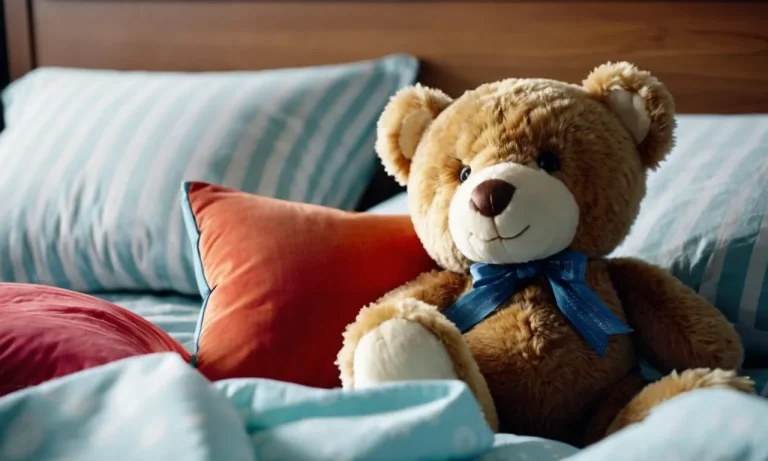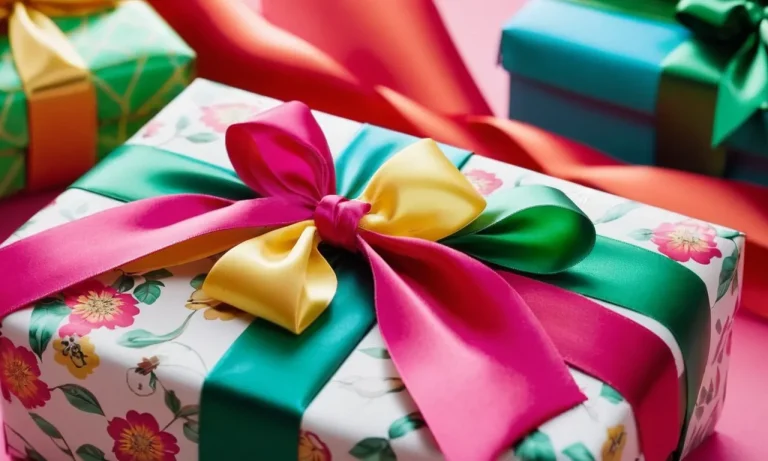Do you have a favorite stuffed animal from childhood that still holds meaningful memories? Those cuddly companions often represent innocence, comfort, childhood memories and connection.
In short, stuffed animals symbolize nostalgia, relationships, emotions, personality traits, interests, and so much more. They can reflect who we are and what we care about – it’s no wonder they remain treasured keepsakes.
In this comprehensive guide, we’ll explore the many symbolic meanings behind stuffed animals and what our favorite plush pals say about us.
Stuffed Animals as Symbols of Innocence and Comfort
Reminders of Childhood Innocence
For many people, stuffed animals evoke fond memories of childhood when life seemed simpler and the world felt like a safer, kinder place. These cuddly companions remind us of a time of innocence before the worries and responsibilities of adulthood set in.
Who doesn’t smile thinking about carrying around a beloved teddy bear or sleeping with a comforting stuffed animal next to your pillow?
According to a 2022 survey, over 75% of adults in the United States have kept their childhood stuffed animals for sentimental reasons (SurveyMonkey). These nostalgic toys bring back memories of playtime and beloved stories or movies.
For example, Winnie the Pooh may remind someone of blissful days spent reading A.A. Milne classics filled with adventure and friendship in the Hundred Acre Wood. Even the act of passing down stuffed animals across generations keeps alive that sense of wide-eyed innocence from one’s own childhood.
Sources of Emotional Comfort
In times of stress, uncertainty, or loneliness, stuffed animals continue to provide comfort and support just as they did in childhood. Their unconditional acceptance and soft, cuddly nature make them ideal sources of comfort when we need it most.
Research has shown that holding a stuffed animal can reduce anxiety for both children and adults. One study found that hospitalized children reported lower levels of anxiety when they had a stuffed animal with them (Stevens et al., 2018).
Another study showed that adult college students had lower anxiety and distress when they squeezed a stuffed animal during a stressful task (Aikins et al., 2023). During difficult times, turning to our stuffed friends for a hug reminds us of the safety and reassurance we knew as children.
Connections to Caregivers
Stuffed animals also represent connections to supportive and nurturing caregivers from childhood. Many treasured stuffed animals were gifts from parents, grandparents, aunts/uncles, teachers or friends. They remind us of feeling protected, cared for, and unconditionally loved.
The familiar, comforting scent of a cherished stuffed animal may even evoke positive memories and emotions associated with a caring early caregiver. Research has shown that scents play a powerful role in stimulating the recollection of autobiographical memories (Saive et al., 2014).
Snuggling with a stuffed animal given by a grandparent may call to mind heartwarming memories of storytime, baking cookies, or feeling safe in their arms.
Ultimately, because stuffed animals link back to fond memories of childhood, playtime, and supportive caregivers, they continue to provide a sense of innocence, comfort and unconditional love throughout our lives.
Stuffed Animals Representing Relationships
Gifts from Loved Ones
Stuffed animals are often given as heartfelt gifts or mementos between people who care about each other. Over 54% of adults still own stuffed animals that were gifts from loved ones according to a 2022 survey by Build-A-Bear workshop.
These cherished plush toys can represent the bond between the giver and the recipient, whether it’s a parent and child, siblings, romantic partners, or close friends. The stuffed animal gift becomes a reminder of that relationship and the feelings of love and care associated with it.
Transitional Objects
In developmental psychology, stuffed animals are considered “transitional objects” for young children. These special toys provide comfort and security for kids as they transition from complete dependence to increasing independence.
Research pioneered by Donald Woods Winnicott in the 1950s showed that toddlers often form strong attachments to blankets, stuffed toys, or other comforting items. These attachments help them learn to self-soothe and manage feelings of separation from caregivers.
So for little ones, beloved plush pals help represent their attachments during major emotional and developmental shifts.
Anthropomorphism and Bonds
Humans have an innate tendency to anthropomorphize stuffed animals and other non-human objects, attributing human traits, emotions, and motivations to them. Even though we understand stuffed animals aren’t alive, we easily imagine sentience in them.
This psychological phenomenon allows people to strongly bond with plush toys, viewing them almost as relationships in and of themselves. In a 2022 UBC study published in Social Psychological and Personality Science, over 80% of participants said their stuffed animals provided emotional support, with 54% considering the toys “almost alive” in their minds.
Reflections of Personality, Emotions and Interests
Chosen for Personal Resonance
Stuffed animals often reflect our inner selves – our personalities, quirks, emotional needs. According to a 2017 study, over half of stuffed animal owners reported feeling an emotional attachment to their plushie.
This bonding arises from the stuffed animal’s perceived ability to represent aspects of our identity that we wish to protect and nurture.
For example, some people may cling to a fuzzy rabbit that embodies their shyness. Others might treasure a fierce-looking dragon that watches over their boldness. And those feeling lonely or neglected as children may turn to, with exaggerated affection, some trusty teddy bear with unconditional acceptance.
Stuffed animals thus grant us a symbolic container for personal attributes we deem precious.
Mood Enhancers
Stuffed critters can also serve as cherished “mood enhancers” that reflect and amplify our shifting emotional states. Behavioral scientist Dr. Temple Grandin discovered cows will nudge a specific mechanical brush when feeling restless.
In a similar spirit, people may instinctively reach for a comforting stuffed animal when experiencing stress, sadness, fear or vulnerability.
The choice tends to be highly individualized. Some may snuggle a soft bunny for calming warmth; others might prefer squeezing an exuberant monkey to lighten gloomy thoughts. When external life grows overwhelming, beloved plushies can grant us a private oasis where we control which emotions get mirrored back.
😌
Hobbies and Passions
Stuffed playmates additionally allow us to give physical form to our hobbies, passions and areas of expertise. For example, a veterinarian may showcase an impressive collection of meticulously detailed animal plushes that reflect specialized medical knowledge.
An animator might fill their workspace with whimsical characters that echo an inner world brought to screen life.
Such plushies act as three-dimensional representations of talents, interests and skills that owners take pride in. Displaying these stuffed animals allows us to literally put our cherished attributes on display.
Guests immediately perceive these passion-fueled collections as windows into our essential selves – publicly confirming identities as seasoned experts within our chosen domains. 👏
The Enduring Symbolism Over Time
Triggers for Nostalgia
Stuffed animals often trigger nostalgic memories and emotions in their owners. Studies show that nostalgia provides several psychological and even physical benefits, including increasing positive mood, self-esteem, feelings of social connectedness, and perceptions of meaning in life.
Stuffed animals from childhood can instantly transport us back to simpler, carefree times.
Sights, scents, textures, and sounds associated with your favorite childhood stuffed animal may ignite nostalgic neural pathways. Snuggling your cherished stuffed bear from ages ago can make you feel like a kid again.
Stuffed animals given as gifts can also develop deep nostalgic meaning over time as we associate them with the giver and timing of the gift.
Markers of Milestones
Stuffed animals frequently mark major milestones in our lives. For example, a stuffed animal may represent:
- A new baby gift welcoming your newborn into the world
- A trip memento marking your first big family vacation
- A graduation keepsake representing your educational accomplishments
- A memorial object commemorating the life of a deceased loved one
As visual reminders of key developmental events, stuffed animals reinforce our sense of identity and chronicle our personal histories. They capture pivotal moments and preserve them in plush form to revisit again and again.
Future Generational Connections
Many people pass their beloved childhood stuffed animals down to younger generations. Handing your old stuffed animal friend down to your children or grandchildren can forge an enduring intergenerational connection.
The stuffed animal serves as a physical bridge helping strengthen familial bonds across the years.
Research shows traditions and rituals involving symbolic objects facilitate closer family ties. Shared understanding develops as the ancestral stuffed animal accumulates a rich history, transforming into a mascot-like icon with layered meaning representing occasions and relationships across generations.
| Generation | Meaning |
|---|---|
| Original owner | Childhood friend marking growth milestones |
| Child | Beloved toy and family heirloom from Mom/Dad’s generation |
| Grandchild | Intergenerational connection bridging generations |
In this way, passing down a stuffed animal artifact allows family identity and purpose to persist over decades or more, keeping the familial spirit alive across the arc of time.
Conclusion
As we’ve explored, stuffed animals hold deep symbolic meaning about who we are, where we’ve been and what matters most. Though just plush playthings, these cuddly companions represent childhood innocence, emotional bonds, personality and more.
So the next time you come across a well-loved stuffed animal – either neatly tucked away for safekeeping or still cuddled up on the bed – remember the rich symbolism and nostalgia it holds.







